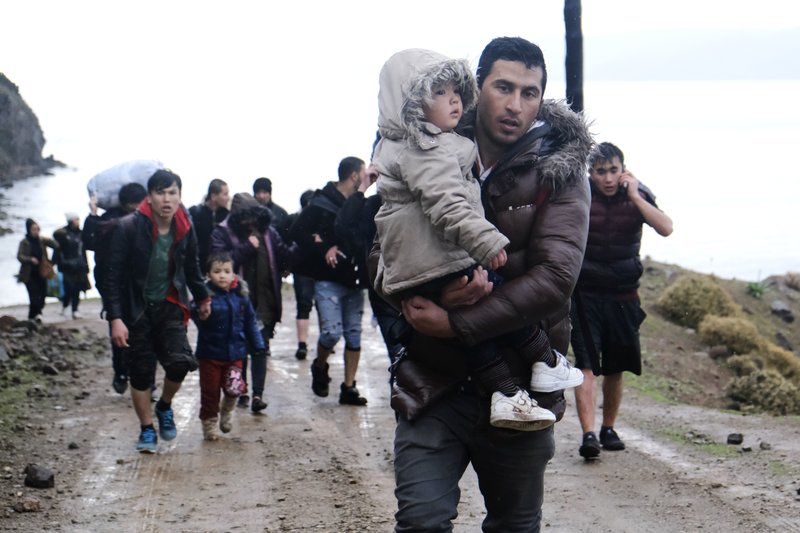ANKARA, Turkey -- Turkey is sending elite special operations police to the border to stop Greek officers from driving back people who try to cross over to Europe, Turkish authorities said Thursday.
Thousands of refugees and other asylum-seekers have tried to enter Greece from land and sea in the week since Turkey declared its previously guarded gateways to Europe open.
Greek police fired tear gas, stun grenades and water cannons to repel people trying to breach the land border from Turkey's side. Turkish authorities allege that Greece's officers also fired live ammunition and killed a migrant.
Turkish Interior Minister Suleyman Soylu said Ankara intends to bring a case before the European Court of Human Rights on behalf of the dead migrant.
The Greek government has said no such fatal shooting occurred. Greek authorities also have claimed Turkish police fired tear gas to disperse Greece's border guards.
During a visit to the border area Thursday, Soylu said 1,000 officers from the tactical units of the Police Special Operation Department would be deployed to the Turkey-Greece border to counter the Greek officers working to repel migrants and refugees.
"As of this morning ... we are bringing 1,000 fully equipped special forces police [along] the Meric River system to prevent the push-backs," Soylu said. "With the help of Zodiac boats, they will [stop] those who mistreat people."
Soylu asserted that Greece violated international conventions by using force to stop about 4,900 migrants from getting across the border. He also accused the European Union and Europe's border protection agency Frontex of complicity by remaining silent.
An estimated 4,000-5,000 people near the Pazarkule border crossing, opposite the Greek village of Kastanies, were being prevented from crossing, Soylu said.
"It is a border gate. They are obliged to take them in. They are obliged to take in asylum-seekers," the minister said.
But he added the migrants were not obliged to use the official border crossing and could cross anywhere along the roughly 125-mile-long border. Much of the border is demarcated by a river, and many have tried wading, rowing or swimming across it.
"I want to say that there is no rule that says they have to cross from Pazarkule," Soylu said.
The minister asserted more than 130,000 people had crossed into Greece since Feb. 27, when Turkey made good on a threat to open its borders. He said about 20-25% of those who reached Greece were Syrians.
There was no evidence to support the number. Although hundreds of people have managed to cross, most appear to have been caught by Greek authorities. Many have said they have been summarily pushed back into Turkey after being detained.
Greek authorities said that from Saturday morning until Thursday evening, they had thwarted 36,649 attempts to enter Greece and made 252 arrests. The situation on the border Thursday was far quieter than in previous days.
After months of threats, Turkish President Recep Tayyip Erdogan said his country no longer agreed to be the gatekeeper for Europe-bound migrants and refugees. His decision and its aftermath on the Greece-Turkey border have alarmed governments in Europe, which is still seeing political fallout from mass migration that started about five years ago.
Erdogan's action came amid a Syrian government offensive in Syria's northwestern Idlib province, where Turkish troops are fighting. The Russia-backed offensive has killed dozens of Turkish troops and sent nearly a million Syrian civilians toward Turkey's sealed border.
In a move that could ease pressure on Turkey's southern border, Erdogan and Russian President Vladimir Putin agreed to a cease-fire in northwest Syria set to take effect at midnight Thursday. The two leaders also stressed "the importance of ... the facilitation of safe and voluntary return of refugees and internally displaced persons to their original places of residence in Syria," according to a joint statement issued at the end of their meeting in Moscow.
Information for this article was contributed by Elena Becatoros, Costas Kantouris and Kirsten Grieshaber of The Associated Press.
A Section on 03/06/2020
